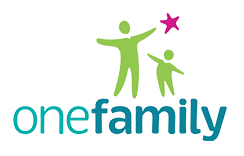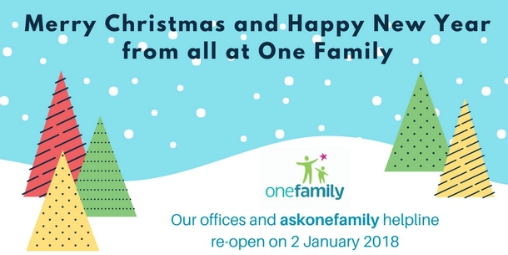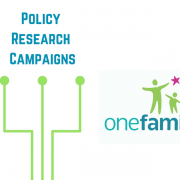Press Release
Budget 2018: Much More Needed to Lift One-Parent Families out of Government-created Poverty
Indecon Report: Government saves €45m net but parents and children are poorer despite working
(Dublin, Tuesday 10 October 2017) One Family, Ireland’s organisation for people parenting alone, sharing parenting, and separating, acknowledges the announcement of the partial Income Disregard restoration – following previous budget cuts – from €110 to €130 per week for One Parent Family Payment (OFP) and Jobseeker’s Transition Payment (JST) recipients, the €5 weekly social welfare payment increase, and the household income threshold for FIS increase by €10 for families of up to three children, along with new housing initiatives. However, it is not enough to lift lone parents and their children out of the consistent poverty and deprivation that resulted from previous reform of the One-Parent Family Payment, and to support them in overcoming systemic barriers in accessing education and employment.
Yesterday the Department of Employment & Social Affairs released the Indecon Independent Review of the Amendments to the One-parent Family Payment since January 2012 which should have formed the basis of changes in Budget 2018 for social-welfare dependent one-parent families. Increases should have been targeted and strategic to reach the poorest children and families across the board, following the evidence and Government commitments to lift 100,000 children out of poverty.
Karen Kiernan, One Family CEO, states: “The Indecon Report is absolutely shocking – more parents are off welfare and working saving the state €45m net but more are living in poverty. There is so much work to be done to ensure that the appropriate services are in place to support people parenting alone into sustainable employment but we did not see that today. Of course, the increase to the Income Disregard is to be welcomed and will help some families. And of course, it is heartening that Government listened to us and the families we work with on this issue. But we must also ask: why have Ministers not taken action on our other recommendations? Following years of ill-advised cuts and reform that targeted lone parents, this must happen now if the poverty experienced by one-parent families in receipt of social welfare payments is to be reversed.
“What lone parents want is a fair chance, and just like all members of our society, they should have one. Lone parents want to work and to learn; they want to have the opportunity to build brighter futures for their families. But the evidence shows that one-parent families are among those who have borne the brunt of years of austerity, that they still experience proportionally higher levels of poverty than any other members of our society today, and that the systemic barriers to employment and education are still not coming down. The recommendations contained in our Pre-Budget Submission, if implemented, will help to create those fair chances.”
Valerie Maher, One Family Policy & Programmes Manager, comments: “Today’s Budget goes a small way towards supporting lone parents and their children, but so much more is needed. It is alarming to see in the Indecon report that even those working full-time following removal from social welfare are living at risk of poverty and in daily deprivation. The Government must also be concerned about these families and not only those on social welfare.
“Currently we see parents in precarious, low paid employment and this is not a victory for Government policy, or a signpost to continue unchanged in this direction, as more children in more one-parent families are living in consistent poverty.”
One Family’s Pre-Budget Submission 2018 included recommendations designed to support lone parents into education and/or employment, while acknowledging their parenting responsibilities. It can be read here.
NOTES FOR EDITORS
- One Family’s Pre-Budget Submission 2018 can be read here.
- Our response to the Indecon Report is here.
- Indecon Independent Review of the Amendments to the One-parent Family Payment since January 2012 is here.
- 1 in 4 families with children in Ireland is a one-parent family (Census 2016)
- 356,203 children lived in one parent families, representing more than one in five or 21.2% of all children in family units (Census 2016)
- The average one parent family is has 1.63 children compared to an average of 1.95 for the population overall (Census 2016)
- Of the approximately 56,000 lone parents in receipt of One Parent Family Payment (OFP) or Job Seekers Transition Payment (JST), 34,700 are not engaged in employment and so remain below the income poverty threshold (Dept. of Social Protection, January 2017)
- There are more than 14,000 One-Parent Family Payment (OFP) recipients in employment, and of 14,500 JST recipients, 5,000 recipients work. Family Income Supplement is also an important support for working parents with approximately 27,000 lone parents in receipt of the payment (Dept. of Social Protection, January 2017)
- Those living in households with one adult and one or more children aged under 18 had the highest deprivation rate in 2015 at 57.9% (Survey on Income and Living Conditions (SILC) 2015)
- 58% (almost three in five) of lone parent households with one or more children experienced enforced deprivation. This compares to 25% of the general population who experienced deprivation (SILC 2015)
- People in lone parent households continue to have the lowest disposable income out of all households with children in the State (SILC 2015)
- Individuals living in households where there was one adult and one or more children aged under 18 had the highest consistent poverty rate at 26.2%, an increase from 25% in 2014. This is compared to a consistent poverty rate of 7.7% for two-parent households (SILC 2015)
- For further facts and figures, visit onefamily.ie.
/Ends.
About One Family
One Family, founded in 1972 as Cherish, celebrates 45 years of supporting one-parent families in Ireland in 2017. It is Ireland’s leading organisation for one-parent families and people sharing parenting, or separating, offering support, information and services to all members of all one-parent families, to those sharing parenting, to those experiencing an unplanned pregnancy and to professionals working with one-parent families. Children are at the centre of One Family’s work and the organisation helps all the adults in their lives, including mums, dads, grandparents, step-parents, new partners and other siblings, offering a holistic model of specialist family support services. These services include the lo-call askonefamily national helpline on 1890 662212, counselling, and provision of training courses for parents and for professionals. One Family also promotes Family Day and presents the Family Day Festival every May, an annual celebration of the diversity of families in Ireland today (www.familyday.ie). For further information, visit www.onefamily.ie.
Available for Interview:
Karen Kiernan, One Family CEO | t: 086 850 9191
Valerie Maher, One Family Policy & Programmes Manager | t: 086 084 6826
Further Information or to arrange an interview:
Shirley Chance, Director of Communications | t: 01 662 9212 or 087 414 8511










